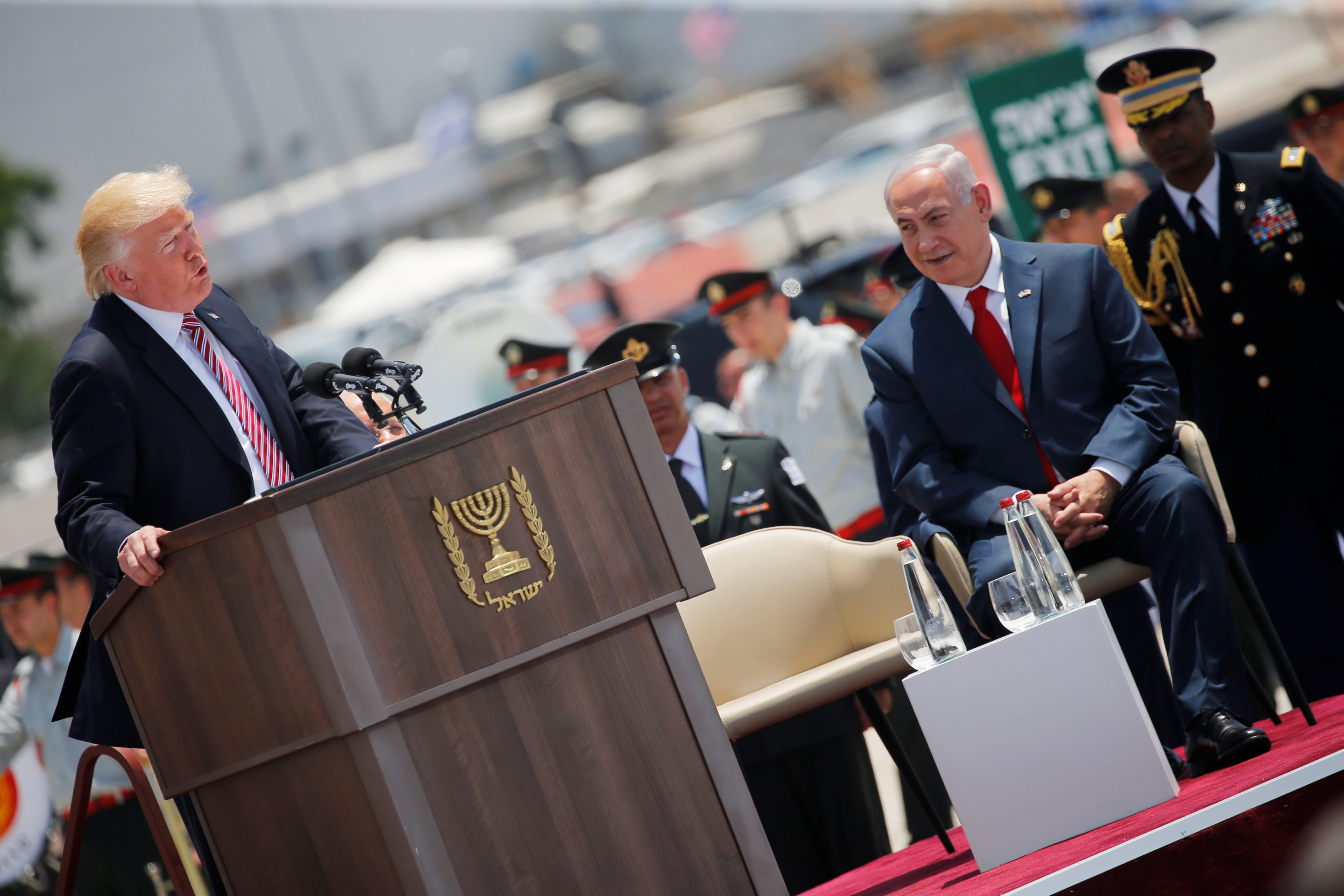
By Steve Holland and Jeff Mason
JERUSALEM (Reuters) – U.S. President Donald Trump said on Monday that he had come to Israel from a weekend visit to Saudi Arabia with new reasons to hope that peace and stability could be achieved in the Middle East.
On the second leg of his first overseas trip as president, Trump was to hold talks separately with Israeli Prime Minister Benjamin Netanyahu and Palestinian President Mahmoud Abbas.
The U.S. leader visited the Church of the Holy Sepulchre in Jerusalem’s walled Old City and was due to pray at Judaism’s Western Wall. He travels on Tuesday to Bethlehem in the occupied West Bank at the end of a stopover lasting 28 hours.
Netanyahu and his wife Sara, as well as President Reuven Rivlin and members of the Israeli cabinet, were at Tel Aviv’s Ben-Gurion airport to greet Trump and first lady Melania in a red carpet ceremony after what is believed to have been the first direct flight from Riyadh to Israel.
“During my travels in recent days, I have found new reasons for hope,” Trump said in a brief speech on arrival.
“We have before us a rare opportunity to bring security and stability and peace to this region and its people, defeating terrorism and creating a future of harmony, prosperity and peace, but we can only get there working together. There is no other way,” he said.
Trump’s tour comes in the shadow of difficulties at home, where he is struggling to contain a scandal after firing James Comey as FBI director nearly two weeks ago. The trip ends on Saturday after visits to the Vatican, Brussels and Sicily.
ARAB WELCOME
During his two days in Riyadh, Trump received a warm welcome from Arab leaders, who focused on his desire to restrain Iran’s influence in the region, a commitment they found wanting in the Republican president’s Democratic predecessor, Barack Obama. He also announced $110 billion in U.S. arms sales to Saudi Arabia.
Israel shares the antipathy that many Arab states have toward Iran, seeing the Islamic Republic as a threat to its very existence.
“What’s happened with Iran has brought many of the parts of the Middle East toward Israel,” Trump said in public remarks at a meeting in Jerusalem with Rivlin.
He also urged Iran to cease “its deadly funding, training and equipping of terrorists and militias”.
But Iran’s freshly re-elected pragmatist president, Hassan Rouhani, said regional stability could not be achieved without Iran’s help, and accused Washington of supporting terrorism with its backing for rebels in Syria.
He said the summit in Saudi Arabia “had no political value, and will bear no results”.
“Who can say the region will experience total stability without Iran? Who fought against the terrorists? It was Iran, Syria, Hezbollah and Syria. But who funded the terrorists?”
Rouhani also said Iran would continue a ballistic missile program that has already triggered U.S. sanctions, saying it was for defensive purposes only.

U.S. President Donald Trump (C) stands next to Western Wall Rabbi Shmuel Rabinowitz at the plaza in front of the Western Wall, Judaism’s holiest prayer site, in Jerusalem’s Old City May 22, 2017. REUTERS/Jonathan Ernst
“ULTIMATE DEAL”
Earlier, at the airport, Netanyahu said Israel hoped Trump’s visit would be a “milestone on the path towards reconciliation and peace”.
But he also repeated his right-wing government’s political and security demands of the Palestinians, including recognition of Israel as a Jewish state.
Trump has vowed to do whatever is necessary to broker peace between Israel and the Palestinians — something he has called “the ultimate deal” — but has given little indication of how he could revive negotiations that collapsed in 2014.
U.S. Secretary of State Rex Tillerson told reporters en route to Tel Aviv that any three-way meeting between Trump, Netanyahu and Abbas was for “a later date”.
When Trump met Abbas this month in Washington, he stopped shortly of explicitly recommitting his administration to a two-state solution to the decades-old conflict, a long-standing foundation of U.S. policy.
Trump has also opted against an immediate move of the U.S. Embassy in Tel Aviv to Jerusalem, a longtime demand of Israel.
A senior administration official told Reuters last week that Trump remained committed to the measure, which he pledged in his election campaign, but would not announce such a move during this trip.

Israel’s Prime Minister Benjamin Netanyahu (R) listens as U.S. President Donald Trump (L) speaks during a welcoming ceremony upon his arrival at Ben Gurion International Airport in Lod near Tel Aviv, Israel May 22, 2017. REUTERS/Jonathan Ernst
On Sunday, Israel authorized some economic concessions to the Palestinians that it said would improve civilian life in areas controlled by the Palestinian Authority and were intended to respond to Trump’s request for “confidence-building steps”.
The United States welcomed the move but the Palestinians said they had heard such promises before.
Trump will have visited significant centers of Islam, Judaism and Christianity by the end of his trip, a point that his aides say bolsters his argument that the fight against Islamist militancy is a battle between “good and evil”.
(Writing by Jeffrey Heller)









